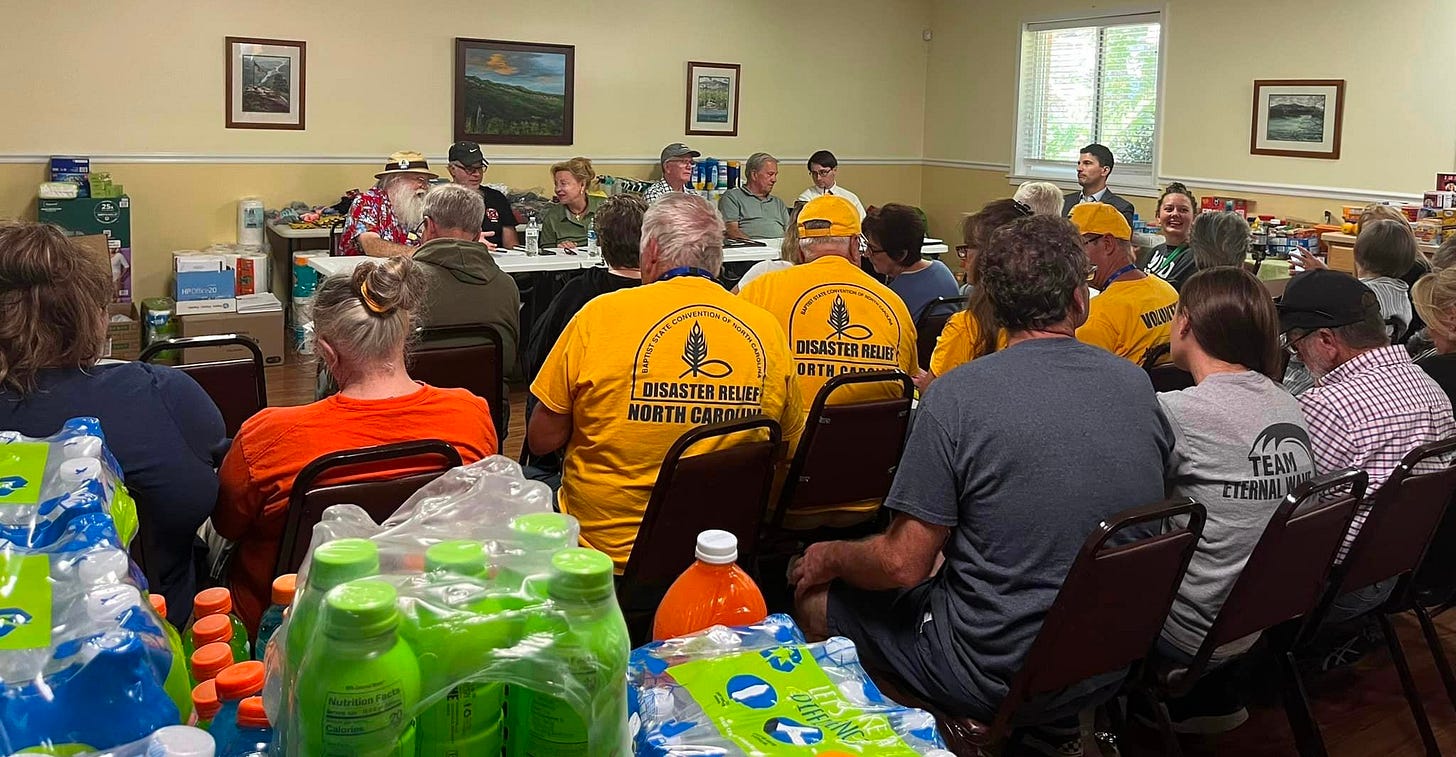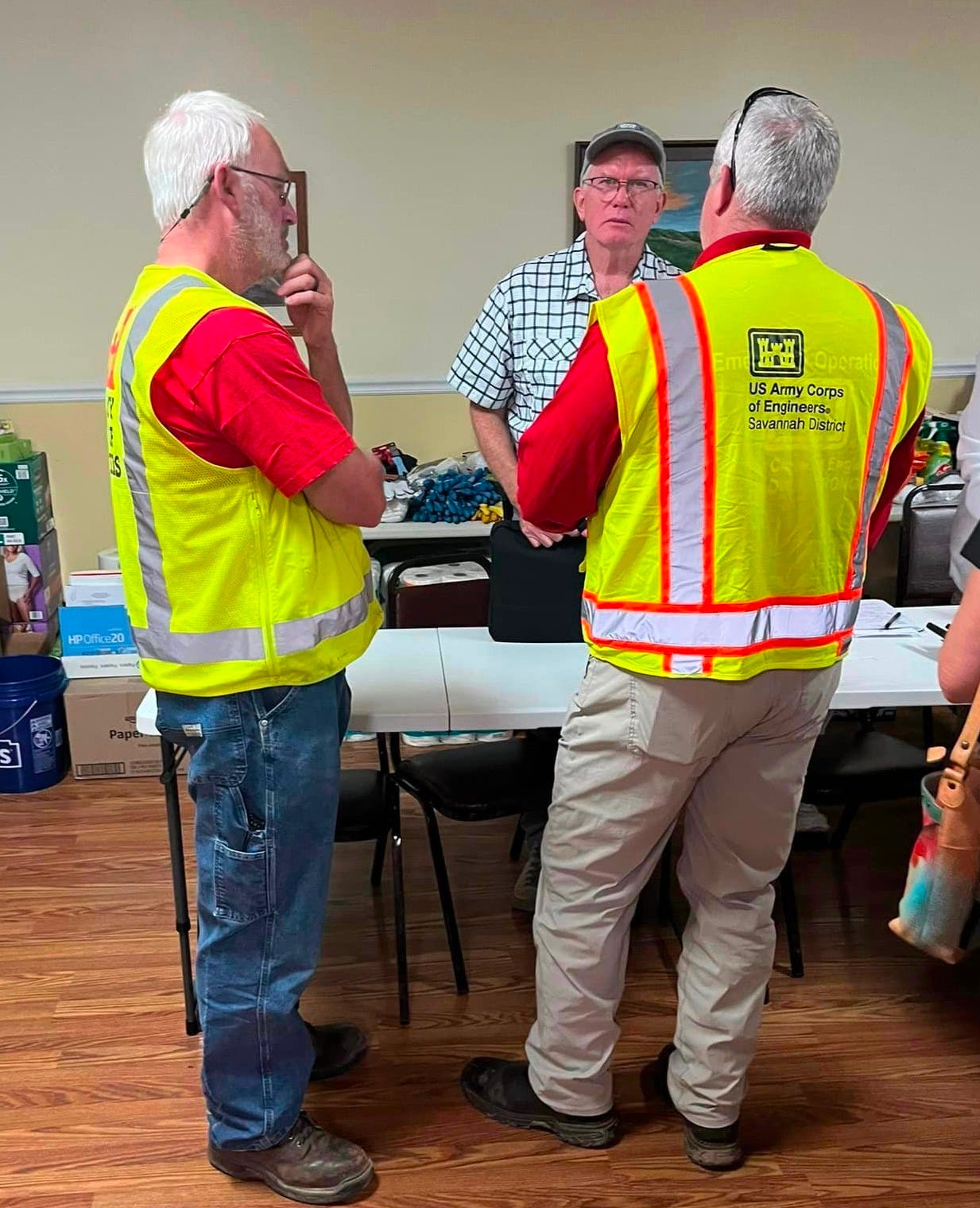Exclusive video: Chimney Rock moves forward in recovery after Hurricane Helene
Mayor O'Leary and town council met Thursday to outline critical access updates, debris removal, and relief efforts as the Village begins rebuilding
To my new subscribers (and a reminder to loyal readers), welcome to Cops & Congress, where facts come first, followed by in-depth commentary and analysis. Paid subscribers enjoy exclusive access to scoops requiring investigation of public records. Your support directly funds the detailed research behind my independent journalism. (ICYMI: Six reasons to support my independent journalism)
Situational awareness: An exclusive, or scoop is an important news story that is first reported by a journalist. This goes beyond breaking news when no other journalists are known to be reporting on an important issue.

At the October 10th Emergency Council Meeting, Chimney Rock Village Mayor Peter O'Leary provided a detailed update on the ongoing recovery efforts following the devastation caused by Hurricane Helene. With many residents and business owners still facing significant challenges, the meeting highlighted crucial decisions and next steps in the village’s path toward rebuilding. For those unable to attend, video coverage of the meeting has been shared on TikTok and YouTube. See links below.
One of the most pressing concerns discussed was the issue of access to different parts of the village. Terrace Drive and Main Street have now seen some progress, with passes distributed to residents, although movement on Main Street remains restricted due to heavy construction equipment and debris. The situation on Southside Drive and areas beyond is more complicated. Currently, no access is available, but the North Carolina Department of Transportation (NCDOT) is actively working on a solution, with hopes to install a temporary bridge soon to restore connection to those areas.
In a significant move, the council approved an inter-local agreement with Rutherford County to expedite the removal of vegetation debris, an important step in clearing the way for more substantial repairs and recovery efforts. Alongside this, a resolution to create a village disaster relief fund was passed, with specific guidelines for how residents can request financial assistance expected to be announced this week. This fund will be critical in helping those most affected by the storm begin to rebuild their homes and businesses.
Several key appointments were also made to strengthen the village’s recovery and communication efforts. Laura Duncan will serve as the coordinator for social media and public relations, ensuring that residents are kept informed of important updates. Additionally, Mike Hager was appointed to represent the village in legislative matters, offering his services pro bono (per the town, he will be paid $1). Both Duncan and Hager's contributions are expected to enhance the village’s ability to secure aid and keep the community informed throughout the recovery process. Hager is a lobbyist, a Green Hill resident, and a former NC House Representative.
One of the more impactful decisions made during the meeting was the temporary suspension of conditional-use permits for short-term rentals. This measure is aimed at prioritizing the needs of long-term residents and allowing the village to focus on rebuilding efforts without the added strain of managing short-term rental properties.
In recognition of the challenges property owners are facing, the village also temporarily suspended certain zoning ordinances. Stephen Duncan, the town administrator and zoning administrator now has the authority to work directly with property owners to help them protect their properties from further damage during this vulnerable time.
Finally, the council appointed J. Meliski as the village’s engineer, a role he will fill in a personal capacity on a pro bono basis (per the town, he will be paid $1). He is a senior project manager at McGill, the firm that had been in charge of the streetscape project before the hurricane. His expertise will be crucial as the village continues to assess the structural integrity of roads, bridges, and buildings in the aftermath of the hurricane.
Mayor O’Leary emphasized that while many hurdles remain, the village is taking every step possible to ensure a swift and safe recovery. Restoring access, removing debris, and providing clear communication to residents are top priorities in the weeks ahead. With continued cooperation from local and state agencies, the Mayor expressed hope that Chimney Rock will soon begin to rebuild stronger than before.
Nearby Buncombe County’s Asheville Police Department shared a public safety message on Sunday, urging homeowners to inspect their properties for mold, especially after flooding or other forms of water damage. "Mold thrives on materials like wood, carpets, and even food, and it reproduces through airborne spores, which can cause health risks if left unchecked," their statement said.
Homeowners affected by water damage are encouraged to address moisture issues immediately and to follow proper mold remediation procedures to avoid further health and structural complications. FEMA’s mold awareness brochure emphasizes the importance of controlling moisture in homes to prevent mold growth, which cannot be entirely eliminated but can be mitigated.
For more information on mold awareness and to access FEMA’s mold brochure, residents are advised to visit FEMA’s website or contact local health departments.
Related Links:
Part 1: TikTok Link
Part 2: TikTok Link
YouTube: Watch Here
For additional resources on mold prevention, check out FEMA’s Mold Brochure.

Opinion & Analysis
Cops & Congress Commentary: Time for Action in Chimney Rock Recovery
Two weeks after Hurricane Helene struck, Chimney Rock Village is still facing serious challenges. While safety concerns are important, the continued delay in allowing property owners back into their homes and businesses raises significant issues. With each passing day, properties remain exposed to the elements and the risk of mold and further damage increases. For a town already devastated by flooding, time is of the essence.
During the recent meeting, it became clear that residents are still waiting for crucial information. There is no set timeline for the reopening of the Southside bridge, which is vital for many property owners to even access their land. NCDOT has not yet conducted the necessary assessments, which is understandable given the scale of the disaster. However, the longer these assessments take, the more damage properties could sustain, making recovery even harder.
Hurricane Helene didn’t just cause structural damage—it disrupted the entire community. Homes and businesses were washed away, leaving many wondering how long it will take to rebuild. Mold and other environmental hazards are likely setting in, creating additional health risks. While town officials are rightly focused on safety, they must also recognize the need to move quickly. The longer property owners are kept out, the more difficult—and expensive—rebuilding will become.
On the practical side, residents are facing basic service disruptions. Power is still out in many areas, and package deliveries have been slow or suspended in some cases. Chimney Rock Village residents may get their mail at the Lake Lure post office, the town said. For a community already struggling to recover, these logistical issues are adding to the stress and uncertainty.
To be fair, the village’s cautious approach is understandable. Town officials don’t want to expose residents to unsafe conditions or rush into reopening without the proper inspections. But at the same time, there needs to be a sense of urgency. The damage caused by the storm won’t wait for government processes to catch up, and every day that passes without action means more potential loss for property owners.
The situation with the river, which changed course during the storm, is another concern. NCDOT plans to rebuild the roads in their previous locations, but it’s unclear how long that will take or what the future holds for the village’s economy, which depends heavily on tourism. The longer the town remains closed, the greater the economic toll will be.
Positive steps are being taken, such as the establishment of the Chimney Rock Village Relief Fund and the promise of volunteer assistance in the coming months. But these efforts will only be effective if the town can be reopened promptly.
It’s time for town officials to strike a balance between safety and speed. Structural assessments are crucial, but they must be done as quickly as possible. Residents need the opportunity to assess the damage, start repairs, and salvage what they can before the situation worsens. Time is a critical factor in recovery, and every day matters in the effort to rebuild Chimney Rock.
🏛️ All those mentioned are presumed innocent until proven guilty.
Learn more about this newsletter and my background. I am guided by the Society for Professional Journalists Code of Ethics. Follow me on X (Twitter), Facebook, Linkedin, Instagram, TikTok, and YouTube. Send constructive criticism, fan mail and tips with public documents for future stories: CopsandCongress@gmail.com.
Interested in sponsoring a future issue of Cops & Congress? Email me with your ideas and budget.
(Free subscribers: Upgrade to paid to leave a comment below and don’t miss out on exclusive content.)


